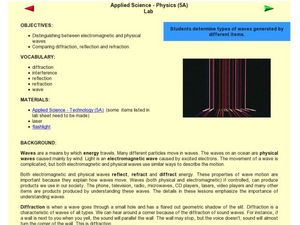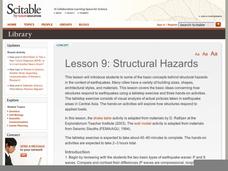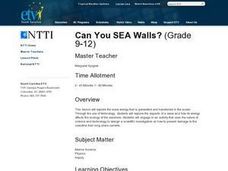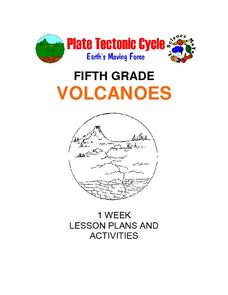Science Matters
Wave Watching
Seismologists use the direction and arrival times of p waves and s waves to determine the distance to the source of an earthquake. The engaging lesson has students line up to form human waves. Through different movements when attached,...
Acoustical Society of America
Anatomy of a Wave
Pair physical science learners up, and have one describe a transverse wave while the other blindly attempts to draw it. Then reveal an actual diagram and explain the different parts of the wave: crest, trough, wavelength. Though most of...
Columbus City Schools
Earthly Waves
How did scientists discover what lies beneath the earth's surface? Dig a hole? X-ray vision? Guide your class through the types of seismic waves and how these waves helped shed light on Earth's many layers. The included resources provide...
Curated OER
Electromagnetic and Physical Waves
Students compare and contrast electromagnetic and physical waves. In this wave lesson plan, students discover that all waves reflect, refract, and diffract energy. Students work in small groups to experiment with waves and evaluate the...
Curated OER
Earthquakes: Fifth Grade Lesson Plans and Activities
After learning about P waves and S waves, fifth graders view the intensity of earthquakes by examining seismographs and images of earthquake damage. Young scientists then forecasting future quakes by analyzing data about...
Curated OER
Checking the Surf
Students read and discuss waves and their wavelengths and amplitudes. In this waves lesson plan, students draw the wavelength and amplitude of a wave and discuss tsunamis and storms.
Curated OER
Earthquakes: Sixth Grade Lesson Plans and Activities
Young seismologists learn more about plate tectonics with a set of pre-lab, lab, and post-lab lessons plans on earthquakes. After exploring how waves travel through various materials, sixth graders record their observations and...
Curated OER
Earthquakes: Third Grade Lesson Plans and Activities
Introduce third graders to energy waves with a hands-on geology activity, in which they answer questions and compare seismograms in the San Francisco Bay area. After a demonstration that shows how bigger waves indicate a...
DiscoverE
Slinky® Science
Toys are great for learning about physics. Scholars use Slinky® toys to study Newton's laws of motion and types of energy. After a little play, they then model longitudinal and transverse waves with the Slinky® toys.
Nature
Structural Hazards
The scientific explanation of seismic waves is detailed in the introduction. A fictional scenario is also provided for your class to discuss. Pictures and handouts that are meant to be included, however, they are not accessible....
PBS
Coastline Change
Continental drift happens over millions of years, but new perspective shows much faster changes. An informative resource offers a short term perspective using a series of satellite images. Viewers observe major changes to a coastline in...
Curated OER
Erosion... Can You Fight It?
Students study erosion and its effects on shorelines. In this erosion instructional activity, students work in an engineering team to design a seawall and submit a cost bid to their teacher. Students must determine the energy of a wave...
Curated OER
Earthquake Waves And Their Destructions
Students investigate primary and secondary waves and how to measure the magnitude of waves. They discover how to find the epicenter of earthquakes. They examine why waves are more destructive in some areas than others through these...
Curated OER
Can You SEA Walls?
Students explore how wave energy that is generated and transferred in the ocean. They explore the aspects of a wave and how its energy affects the ecology of the seashore. Students engage in an activity that uses the nature of science...
Curated OER
Earthquakes: Fourth Grade Lesson Plans and Activities
Examine earthquake intensities and ways to measure an earthquake through the comparison of the Mercalli and Richter scales. After completing the pre-lab worksheet, fourth graders compare high and low intensity quakes by testing...
Curated OER
Volcanoes: Sixth Grade Lesson Plans and Activities
Bring a set of pre-lab, lab, and post-lab lesson plans on volcanoes to your earth science unit. Sixth graders explore the three types of volcanoes found on Earth, plot the specific locations of these volcanoes on a map, and...
Space Awareness
Britannia Rule the Waves
Could you determine longitude based on measuring time? Early explorers used a longitude clock to do just that. Scholars learn about early exploration and the importance of the invention of the clock. Then pupils build their own longitude...
Curated OER
Black and White Bottle Experiment
Students investigate solar energy and color. In this solar energy instructional activity, students assess the benefits of solar energy. Students discover that solar energy is attracted to darker colors and conduct an experiment...
LABScI
Acoustics: The Sound Lab
If the delay between a sound and its echo is less than 1/10th of a second, the human ear can’t distinguish it. Through the use of a Slinky, rubber band guitar, and straws, scholars explore where sound comes from and how it travels....
Curated OER
Waves, Sound, and Light
Ninth graders explain waves in terms of energy transfer and describe their basic types and characteristics. They solve mathematical problems involving wavelength and frequency. Students conduct experiments in reflection and refraction.
Cornell University
Shedding a "Little" Light on Cancer Surgery
Many types of cancer treatments now depend on nanotechnology—a big "little" discovery. Scholars begin by removing "malignant" tissue from simulated brains, one using fluorescent markers thanks to nanotechnology and one without. This...
Curated OER
Plate Tectonics: Fifth Grade Lesson Plans and Activities
Fifth graders continue their investigation of the plate tectonics cycle with an exploration of the movement of Earth's crust. During the lab, young geologists conduct an experiment to discover the result of different types of...
Curated OER
Plate Tectonics: Third Grade Lesson Plans and Activities
Third graders examine plate movements and boundaries with a lab that demonstrates how volcanoes and earthquakes are formed. It presents different types of stresses an object can withstand through a hands-on...
Curated OER
Volcanoes: Fifth Grade Lesson Plans and Activities
Fifth graders explore volcanoes and the rocks they produce using the Internet. The lab portion of the lesson prompts young scientists to compare and describe igneous rocks. Next, they critique a pair or more of...























